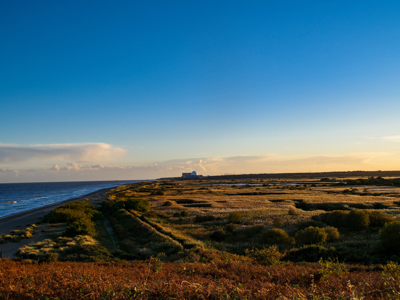
Suffolk Energy Action Solutions (SEAS) disappointed at court’s refusal to hear arguments that payments to landowners distort arguments against developments
A community group opposed to the massive concrete development of an area of rural Suffolk to facilitate offshore windfarms have voiced their major disappointment at being refused permission to take their fight any further in the courts.
Posted on 12 July 2024
Suffolk Energy Action Solutions (SEAS) were refused permission to appeal to the Supreme Court in their fight against a Scottish Power subsidiary developing infrastructure across vital wetlands, SSSI and farmland adjacent to a thriving village for two offshore windfarms off the Suffolk coast.
They argued that up to 55 compulsory purchase orders for affected land distorted the picture put before the Secretary of State before he gave development consent orders for the works by East Anglia One North Ltd and East Anglia Two Ltd at Friston.
The Secretary of State wouldn’t have been able to consider all the issues fully because of “non-objection clauses” imposed by the developers, said SEAS. The clauses commonly used in agreements relating to compulsory purchase orders (CPO) prevent land and property owners objecting to a planning application when they agree to sell their assets to make way for the development.
SEAS argued in a judicial review claim at the High Court that “non-objection clauses” had “stifled” or “neutralised” the ability of landowners facing possible compulsory purchase to present objections to and information about a scheme for which East Anglia were seeking development consent. The problem was compounded by the fact that the Heads of Terms/Option Agreements within the CPOs also contained confidentiality provisions.
The group said that when the plan for the full infrastructure, the size of 80 football pitches, was put before the Secretary of State, he wouldn’t have a balanced view of the issues because the process had been unfairly distorted, and hindered a proper enquiry about whether the proposed development was in the public interest.
The onshore works for each development are similar and involve the laying of underground cables for exporting the electricity generated by the windfarms from a landfall north of Thorpeness to a new substation at Friston, and to a new National Grid substation. One of the onshore cable routes affects an Area of Outstanding Natural Beauty.
In their application to appeal to the Supreme Court, SEAS said the non-objection clauses were unlawful because they prevented or dissuaded the landowners from raising any objections to the proposed development, even those wholly unrelated to the impact on their own land. The Option Agreements expressly required the landowners to withdraw any objections they had already articulated.
Confidentiality clauses prevented landowners from telling the Secretary of State, or, indeed, SEAS, what, if any, objections they might otherwise have raised.
Therefore, SEAS said, the Secretary of State was in no position to reach a lawful decision that the information before him was enough to enable him to decide whether to grant the applications.
After permission was refused, Fiona Gilmore of SEAS said:
“It is extremely disappointing that the Supreme Court has rejected our application and decided not to scrutinise further the use of non-objection clauses by developers. We, like many other objectors to environmentally damaging projects, feel that the system is already tilted against the ordinary citizen. This ability of powerful developers to make payments to those impacted by projects, on condition that they do not make objections, or indeed withdraw any previous objections, is something we think needs to be looked at again. We hope that the new government will now do that.
“Our community group has since 2019 promoted better offshore solutions using brownfield sites closer to demand. A technology revolution has occurred over the last five years and there is no doubt that these offshore hybrid assets using meshed grids are now the way forward not just for Belgium, Holland, Germany and Denmark, but also for the UK.
“With the advent of Great British Energy and a newly constituted impartial System Operator, this country should now halt these wrong plans in the wrong places and pivot to the Future Framework as advocated by Nick Winser in 2023 and endorsed by Ofgem in its 1 March 2024 Report on Offshore Hybrid Assets.
“These offshore solutions are cheaper and faster in the mid- term, because only half of the onshore infrastructure is required. Ofgem concludes that energy resilience is better guaranteed and both ecological and societal impacts are minimised.
“For local communities, this has been an asymmetric energy infrastructure challenge, unequal because our voices have been drowned out and unfair because it is “stupid vandalism” to carry 30% of the UK’s electricity through a five square mile area famous for its rainforest equivalent, Suffolk Coast and Heath’s vital lowland wetlands. With over 80 football pitches of concrete monoliths towering over Church steeples and cable trenches slicing through the countryside, this will be a seismic shift from a deeply rural tourism destination to an industrial Node permanently changing the cultural landscape, killing businesses and communities in its wake.”
Suffolk Energy Action Solutions was represented by Leigh Day partner and joint head of human rights, Jamie Beagent, who said:
“Our client is obviously extremely disappointed that the Supreme Court has decided not to grant permission for an appeal. There is at the very least a significant tension between the principle of public participation in the scrutiny process for large scale developments and the ability of developers to preclude participation when buying out property rights. Our client has raised this issue through the courts and, although unsuccessful in its legal challenge, hopes that this dissonance will now be looked at by parliament."

Jamie Beagent
Joint head of the human rights department specialising in judicial review and public law.

Campaigners win permission to appeal against Sizewell C Nuclear Power Station ruling
Campaigners have won permission for another hearing to challenge the go ahead to build Sizewell C Nuclear Power Station on the issue of a permanent water supply and because of public interest in the development.

Historic Supreme Court judgment rules planning permission for oil production at Horse Hill, Surrey is unlawful and must be overturned
In a ground-breaking judgment the Supreme Court has today, Thursday 20 June 2024, ruled that planning permission for fossil fuel production should not be granted unless and until a planning authority has properly assessed the climate impact of the project and specifically assessed the downstream greenhouse gas (GHG) emissions that will inevitably arise from the combustion of the fuel.

